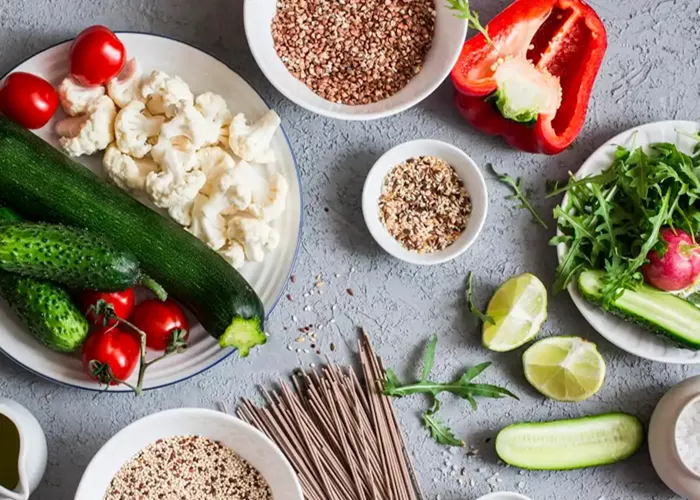Liver health is critical for overall well-being, influencing everything from digestion and detoxification to blood sugar regulation and immune function. Given its central role in maintaining bodily functions, it’s vital to ensure the liver is well taken care of. While reducing alcohol consumption remains a key factor, experts are increasingly emphasizing the positive effects a plant-based diet can have on liver health. From leafy greens to citrus fruits, a variety of nutrient-dense plant foods may support liver function in significant ways.
Lifestyle Habits and Liver Function
Research underscores that lifestyle choices are integral to liver health. Regular physical activity, for example, helps maintain a healthy weight, reduces liver fat buildup, and supports blood circulation—essential factors for a functioning liver. Conversely, chronic stress, inadequate sleep, and smoking can all contribute to liver damage.
Of course, alcohol consumption remains one of the most impactful lifestyle factors on liver health. The liver is responsible for processing about 90% of the alcohol consumed, and excessive intake can lead to conditions such as cirrhosis, liver failure, and even liver cancer. According to the Addiction Center, chronic alcohol abuse can contribute to fatty liver disease in up to 20% of heavy drinkers, although this is typically reversible with alcohol abstinence. Alcoholic hepatitis, a condition characterized by liver inflammation, can also advance to cirrhosis, though it too is reversible with abstention from alcohol.
Can Diet Influence Liver Health?
While alcohol is a well-known risk factor, diet also plays a significant role in liver function. “The liver is responsible for filtering toxins from the body, processing what we consume, and metabolizing nutrients,” says Jordan Anthony, MS, RDN of the nutrition platform Ahara. In fact, certain dietary choices have been linked to liver conditions like fatty liver disease, which is becoming increasingly prevalent.
A study published in Clinical Gastroenterology and Hepatology in 2023 found a strong connection between fast food consumption and an increased risk of fatty liver disease. Specifically, individuals with obesity or diabetes who consumed more than 20% of their daily calories from fast food were found to have elevated fat levels in their liver cells. “Healthy livers typically contain less than five percent fat, and even a slight increase can result in non-alcoholic fatty liver disease (NAFLD),” explained Dr. Ani Kardashian, MD, a hepatologist at Keck Medicine.
NAFLD, characterized by excess fat in the liver cells, has many contributing factors including genetics, medications, and poor lifestyle habits. A 2024 study published in Nature Communications Medicine noted that NAFLD now affects more than 40% of Americans.
However, there is good news. The liver is highly resilient and has an extraordinary ability to regenerate and heal when given the right conditions. That said, liver damage from conditions like cirrhosis may not always be reversible. But the liver can often recover with proper care and attention, including a well-balanced diet rich in antioxidants and other liver-supporting nutrients.
Nutrients Essential for Liver Health
A diet rich in fiber, vitamins, and antioxidants can help support the liver’s detoxifying abilities. Fiber aids in eliminating toxins during digestion, while vitamin C helps prevent fat accumulation in the liver. As an antioxidant, vitamin C reduces oxidative stress, which is particularly damaging to liver cells.
“The liver plays a critical role in metabolizing everything we consume,” Anthony explains. “This makes diet one of the most crucial elements in maintaining liver health.” Luckily, there are several foods and beverages known for their liver-boosting properties, including coffee, green tea, nuts, seeds, fresh fruits, and green vegetables. Staying hydrated is equally important, as it helps dilute toxins in the bloodstream, alleviating strain on the liver.
Plant-based foods are particularly beneficial for liver health. A 2020 study in the Journal of Gastrointestinal and Liver Diseases found that participants who followed a plant-based diet for six months experienced improved liver enzyme levels, signaling better liver function. These findings further support the idea that plant-based eating patterns may not only help prevent liver disease but also aid in the management of existing conditions such as hepatitis, fibrosis, and cirrhosis.
Five Plant-Based Foods to Support Liver Health
Leafy Greens
Leafy greens like kale, spinach, and arugula are packed with antioxidants, fiber, and vitamin K. They also contain chlorophyll, which supports detoxification.
Recipe idea: Warm Kale Salad with Roasted Sweet Potatoes
Beets
Beets are rich in betalains, powerful antioxidants known for their anti-inflammatory and detoxifying properties. High in fiber and essential minerals like potassium and manganese, beets promote liver health.
Recipe idea: Vegan Sushi Sandwich with Crispy Tofu and Pickled Beets
Avocado
With healthy fats, fiber, and vitamins like E and C, avocados are often classified as a “superfood.” These nutrients protect the liver from oxidative stress and support its function.
Recipe idea: Vegan Avocado Nori Crostini
Citrus Fruits
Citrus fruits such as lemons, oranges, and grapefruits are high in vitamin C and antioxidants. They promote liver enzyme production and help neutralize free radicals in the liver.
Recipe idea: Vegan Buttery Lemon Pasta with Cashew Cream
Cruciferous Vegetables
Broccoli, cauliflower, and Brussels sprouts contain sulfur-containing compounds that aid in detoxification. These vegetables also offer anti-inflammatory properties and antioxidants, further supporting liver health.
Recipe idea: Roasted Brussels Sprouts with Garlic and Lemon
By incorporating these nutrient-dense foods into your diet, you can make a significant impact on liver health, protecting this vital organ and supporting its essential functions.
Related Topics:
Can You Eat Brown Rice On Mediterranean Diet


